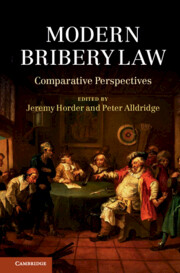Book contents
- Frontmatter
- Contents
- List of contributors
- Table of cases
- Table of statutes and international instruments
- Introduction
- Part I Bribery law: between public wrongdoing and private advantage-taking
- 1 Reformulating bribery: a legal critique of the Bribery Act 2010
- 2 Official and commercial bribery: should they be distinguished?
- 3 Countering corrupting conflicts of interest: the example of Hong Kong
- Part II Bribery without borders: tackling corruption in the EU and beyond
- Part III Ill-gotten gains: the challenge of prosecution, enforcement and asset recovery
- Bibliography
- Index
- References
2 - Official and commercial bribery: should they be distinguished?
from Part I - Bribery law: between public wrongdoing and private advantage-taking
Published online by Cambridge University Press: 05 May 2013
- Frontmatter
- Contents
- List of contributors
- Table of cases
- Table of statutes and international instruments
- Introduction
- Part I Bribery law: between public wrongdoing and private advantage-taking
- 1 Reformulating bribery: a legal critique of the Bribery Act 2010
- 2 Official and commercial bribery: should they be distinguished?
- 3 Countering corrupting conflicts of interest: the example of Hong Kong
- Part II Bribery without borders: tackling corruption in the EU and beyond
- Part III Ill-gotten gains: the challenge of prosecution, enforcement and asset recovery
- Bibliography
- Index
- References
Summary
In a recent study of how the public views the blameworthiness of various white collar crime-related activity, my collaborator, Matthew Kugler, and I asked our subjects to compare the acts described in two seemingly similar scenarios. In one scenario:
Jones is ‘a member of the upper house of the State Legislature, where he serves on an important legislative committee that is choosing the site of a major new state office building’. Larson is ‘CEO of a company that owns property adjacent to one of the sites that Jones’ committee is considering’. CEO Larson offers Jones, the legislator, $20,000 in return for Jones’ agreeing to vote for the site, and Jones accepts the offer.
In the other scenario:
Heller is ‘a board-member of a large private corporation . . . currently serving on an important committee within the company that will choose the site of a major new office building that the company plans to build’. Larson is again ‘CEO of a company that owns property adjacent to one of the sites that Heller’s committee is considering’. Larson offers Heller, the company board member, $20,000 if Heller votes for the site Larson favours, and Heller accepts the offer.
- Type
- Chapter
- Information
- Modern Bribery LawComparative Perspectives, pp. 39 - 65Publisher: Cambridge University PressPrint publication year: 2013
References
- 3
- Cited by



